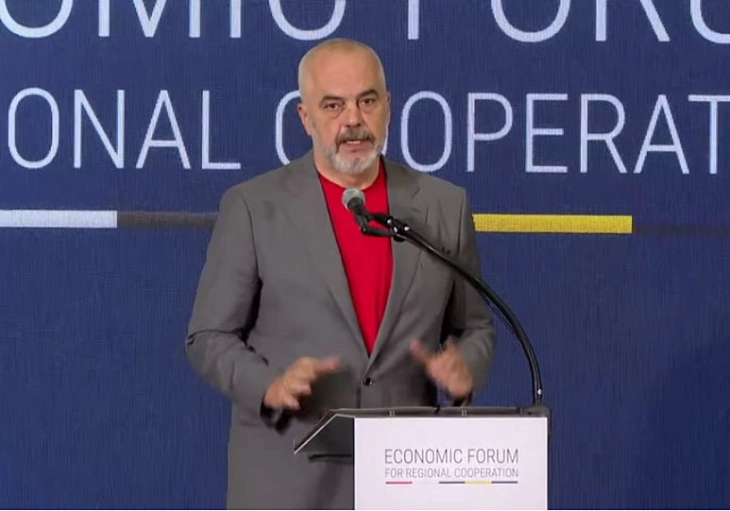Rama: We start doing in the region today what we’ll do in EU tomorrow

Skopje, 29 July 2021 (MIA) – The region can’t continue to be a hostage of the past, because divided we’re small. Through this initiative, we want to focus on the future. What we’ll do in the EU tomorrow, we start doing here, in the region, today, Albania’s Prime Minister Edi Rama said on Thursday at the opening of the Economic Forum on Regional Cooperation in Skopje.
“Why should we wait behind our borders, turning our backs to each other, like we’ve done in the past 500 years, when the moment we join the EU we’ll do what we’re doing here without it,” Rama stressed.
He added that we can’t take away the region’s cooperation potential, but instead make up for lost time. We, he noted, don’t have the luxury of wasting any more time, because we’ve lost a lot.
“This is nothing but establishing an environment for EU principles, values and mechanisms, in which every country resumes individual EU accession efforts. Trucks carrying goods within the region will now spend less time waiting at border crossings. The trade industry is well aware of how much time is spent waiting at borders. Conflicts are not the way towards EU accession. Unresolved issues won’t be solved any faster by denying the potential of this partnership. The more we transform cooperation potential into free movement, the higher the chances are of resolving all disputes, as societies move into a new level of understanding themselves and others, as well as the future,” Rama said.
The Albanian PM added that the significance of Thursday’s event has been made that much greater by the presence of business community representatives from Albania, Serbia and North Macedonia, as well as from Montenegro, Bosnia and Herzegovina, Slovenia, Greece, etc.
He underlined the initiative’s strategic importance for Albania and the business community, adding that a lot more can be accomplished in a common regional economic space, than what countries can do on their own.
At Thursday’s event, which brings together more than 300 companies alongside representatives of international institutions, the new name of the regional initiative informally known as “Mini Schengen” will be unveiled, along with the signing of trilateral agreements aimed at improving people’s lives and operations of the business community in the Western Balkans.







